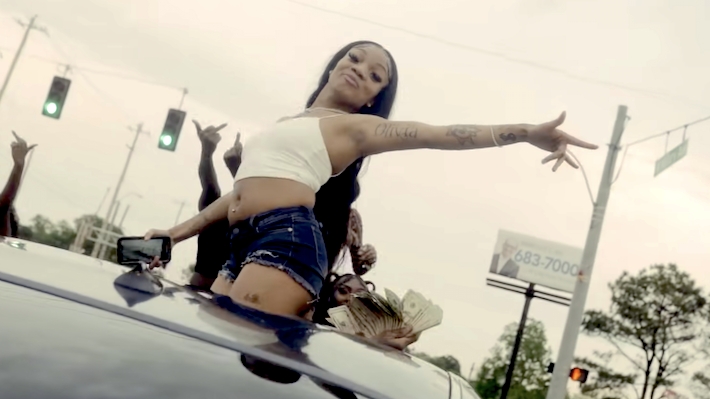The hip-hop success story of the year is inarguably Memphis rapper GloRilla, who exploded in popularity after the viral spread of her and Hitkidd’s hit single “F.N.F. (Let’s Go),” signing to Yo Gotti’s label CMG and subsequently becoming a hometown household name. She’s since collaborated with Cardi B, earning her first-ever Hot 100 top ten, won Breakthrough Artist at the 2022 BET Hip-Hop Awards, and announced her debut project, Anyways, Life’s Great… However, just because her life is great right now doesn’t mean it’s all smooth sailing, as fans learned thanks to a Twitter back-and-forth between Glo and “F.N.F” producer Hitkidd.
According to Hitkidd, CMG and Interscope are now claiming ownership over the breakout single after singing Glo, and he’s naturally upset that he wasn’t included in the negotiations. “So basically these folks are trying to take me to court over ‘FNF’ because they want to OWN the song,” he wrote. “BUT they want to own the song to put it on this EP which both parties knew. So tell me how you gone PUT ‘FNF’ in your contract without telling me, AFTER I told you & your MANAGER everyday that we was in LA with Saweetie, that labels are going to try to sign you because of FNF so watch out. I also told you to let me know when labels reach out so we can be on the same page, but you still went and signed my song without telling me.”
Hitkidd calls out Glorilla for including “FNF” in her label contract without telling him. pic.twitter.com/oQ06sGdJLY
— Rap Alert (@rapalert6) October 17, 2022
However, GloRilla hit back with her own side of the story (on Facebook, of all places), saying, “N**** done made so much money from FNF & I haven’t made not 1 red cent (other than shows ) but I’m stilll prospering cause guess what ??? I CAN RAP IN REAL LIFE & ain’t no mf 1 hit wonder !!!! I WROTE EVERY SINGLE LYRIC IN EVERY SINGLE SONG I EVER PUT OUT & even after all this I still got luv for hitkidd cause we came up together even doe he been going behind my back every since the song blew but dats another story for another day. I just hate da fact he had to bring da business to social media.”
Glorilla responds.. “I haven’t made 1 red penny from FNF (other than shows) I can rap in real life & ain’t no one hit wonder!” pic.twitter.com/u5aQYsLFSm
— SAY CHEESE! ?? (@SaycheeseDGTL) October 17, 2022
She also posited, “N****s been salty every since ian sign to dey label to be a group for $0 smh,” adding, “One more thing before I log out. N**** you signed da song away the first week (without me knowing) for 50k because you didn’t know how big it was gone be! Should I keep going???”
Glorilla responds to Hitkidd’s accusations. https://t.co/Ss2fS4qkRN pic.twitter.com/8NuJNNqA4i
— Rap Alert (@rapalert6) October 17, 2022
Glorilla with another response to Hitkidd accusing her of including “FNF” in her label contract without telling him. https://t.co/TmjoBuKzn5 pic.twitter.com/UPQPErFy3k
— Rap Alert (@rapalert6) October 17, 2022
It’s disappointing but it comes as no suprise that there is a dispute over ownership of the song. These days, where nearly any artist can have a viral breakout leading to a major-label contract, those labels want to maximize return on their investment by including the breakout hits in the deal. However, independent artists usually don’t have ironclad contracts in place for the songs, sometimes leading to rights issues such as this one or Armani White being unable to clear “Billie Eilish” due to both the sample and the mention of the popstar’s name in the title. (It also explains why the Saweetie remix was suddenly swapped out for one featuring JT of City Girls and Latto, since one was apparently masterminded by the song’s producer while the other was spearheaded by the label.)
Sometimes these things get worked out before it ever goes to court — most likely, Interscope wants to buy out Hitkidd’s ownership in hopes of staving off a future lawsuit in case the song becomes even more lucrative in the future — but ever since the blog era blew the doors off of the mainstream access afforded by streaming and social media, many artists have had to pay the price when those lawsuits do come around. For instance, Mac Miller was forced to pay Lord Finesse millions in royalties for an uncleared sample on an early mixtape.
The big difference now is that we see these disputes forming earlier in the process as artists and producers take their grievances to Twitter (and apparently Facebook) to vent their frustrations or seek sympathy from fans. Hopefully, this will be one of those cases that ends with a satisfactory result for all involved — but that’s more likely if everyone just logs off and handles this behind the scenes instead.




